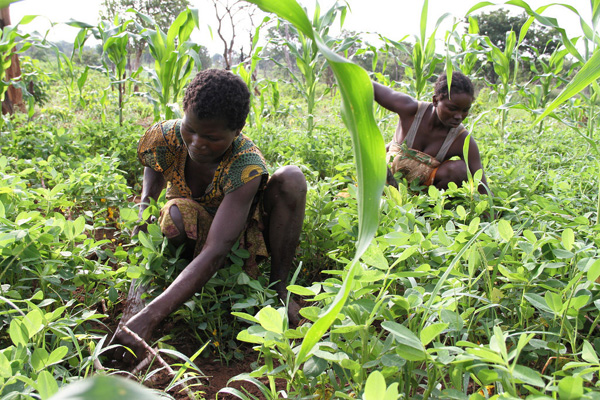
Farming sector hit by insecurity as Central African Republic crisis grinds on UN report
The report – jointly produced by the UN Food and Agricultural Organization (FAO) and the World Food Programme (WFP) – blamed widespread looting and insecurity for negatively impacting crops, livestock and fishing in the CAR. Such adverse events caused the country’s agricultural sector to contract by 46 per cent in 2013, in the wake of a crisis in the country that has caused massive displacements and driven hundreds of thousands of people to flee across its borders, the report found.
“WFP is particularly concerned about the situation of internally displaced people and isolated communities,” said Arif Husain, WFP’s chief economist, in a news release on Wednesday. “Field surveys show about half of these households have critically low levels of food consumption and are at high risk of malnutrition and therefore rely largely on food assistance,” he added.
Specifically, the Crop and Food Security Assessment Mission report found that production of the main staple cereals and cassava in 2014 was estimated at 763,000 metric tonnes, 11 per cent higher than 2013, but still 58 per cent lower than the 2008-2012 pre-crisis average.
Negative impacts on food production were tempered by FAO’s support to about 111,750 households through the provision of seeds and tools ahead of planting to support crop production, in addition to WFP’s delivery of seed protection rations to limit the risk of planting material consumption.
“While these efforts prevented the food and farming situation from becoming even more desperate, we need additional support to boost food production and the agricultural sector, which is the primary means of survival for many people and the backbone of the Central African Republic’s economy,” said FAO Country Representative Jean-Alexandre Scaglia.
The report noted that food reserves in rural areas are now about 40-50 per cent less than average levels, as a result of recurring raids. This is forcing families who have lost most of their productive assets and income due to the crisis to find other ways to acquire sufficient food for their families.
Furthermore, disruptions to trade resulting from unsafe roads have led to severe shortages of essential food items, prompting price surges in many areas.
As income sources have dried up, households are also being forced to switch to other activities – such as gathering and selling wood and charcoal – to get by. The FAO/WFP assessment found that many families are skipping meals and reducing portions.
Compared with pre-crisis levels, livestock numbers are estimated to be down by as much as 77 per cent, due to frequent raids and cattle-rustling, while the fish supply declined by about 40 per cent, owing to insecurity in fishing areas along the country’s rivers and the loss of fishing equipment, the report found.
The assessment also underscored that between a quarter and a third of the people in the CAR were already food-insecure prior to the crisis, struggling to access adequate food on a regular basis. In Bangui, the country’s capital, inflation rose to 12 per cent in August 2014 from 3.5 per cent in January, eroding the purchasing power of families, according to the report. In addition, prices of staple foods increased by 30-70 per cent from March to August 2014.
Farmers at work in the Central African Republic (CAR). Photo: FAO/A. Masciarelli
Support Our Journalism
We cannot do without you.. your contribution supports unbiased journalism
IBNS is not driven by any ism- not wokeism, not racism, not skewed secularism, not hyper right-wing or left liberal ideals, nor by any hardline religious beliefs or hyper nationalism. We want to serve you good old objective news, as they are. We do not judge or preach. We let people decide for themselves. We only try to present factual and well-sourced news.







